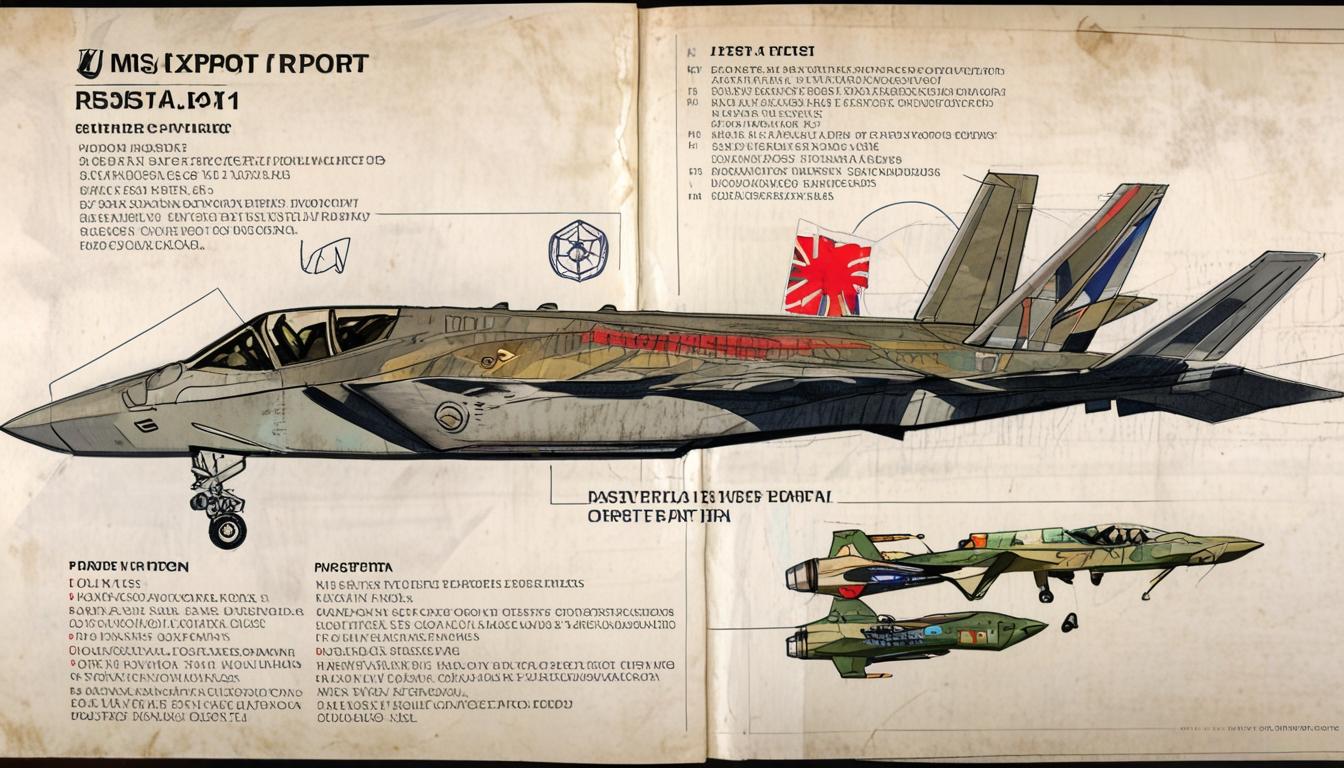A new report exposes continued arms exports from the UK to Israel via loopholes, raising concerns over government transparency and adherence to international humanitarian law ahead of a major legal challenge.
The International Centre of Justice for Palestinians (ICJP) has voiced its approval of a troubling report released on 7 May, titled “Exposing UK Arms Exports to Israel.” This collaborative effort by Progressive International, the Palestine Youth Movement (PYM), and Workers for a Free Palestine draws on data from the Israel Tax Authority, unveiling the disturbing extent of arms exports from the UK to Israel.
According to the report, over 8,000 munitions have been exported from the UK since the government announced a partial suspension of export licences in September 2024, continuing right up until March 2025. This alarming data raises serious concerns about the UK’s compliance with its own arms export regulations, especially given prior government assurances about restricting arms provided to Israel.
The report highlights a critical loophole regarding export controls: while the UK government suspended the direct export of F-35 components, spare parts can still reach Israel via third countries like the United States. Government officials argue this circumvention is crucial to maintaining the global F-35 supply chain, which they claim ensures the security of the UK and its allies. Yet, evidence in the report suggests a blatant contradiction, indicating that the UK may have continued supplying parts for F-35 jets to Israel despite assurances made by senior ministers in Parliament regarding the nature and volume of arms exports.
Voices critical of the government’s transparency, such as Jeanine Hourani from PYM, emphasize that more reliable data about UK arms sales to Israel could be gleaned from Israeli sources than from the UK’s own murky trade statistics. She described the situation as “shocking,” underlining an urgent need for the UK government to provide detailed licensing and export statistics to enable a thorough investigation into these shipments.
This report surfaces just days before an impending High Court hearing concerning a legal challenge against the UK government’s ongoing arms sales to Israel, initiated by the Palestinian human rights group Al-Haq and the Global Legal Action Network (GLAN). This legal inquiry underscores the mounting pressure on the UK’s arms trading practices, particularly as the fallout from conflicts continues to escalate.
Further analysis reveals that since 2018, the UK has authorized £146 million in arms sales to Israel across various export licenses. However, many of these transactions have occurred under Open General Export Licences, which afford limited scrutiny regarding the quantities shipped. Data shows that military exports to Israel were valued at £42 million in 2022, decreasing to £18 million in 2023. Yet even modest UK arms sales have drawn considerable attention amid escalating human rights debates, particularly in a landscape dominated by larger suppliers like the U.S. and Germany.
The suspension of arms exports, characterized by Foreign Secretary David Lammy as essential to preventing violations of international humanitarian law, has not been deemed stringent enough by numerous human rights advocates. They argue that a partial suspension fails to confront the broader context of military support for Israel amidst serious allegations of human rights violations in occupied territories.
The government’s actions in this domain reflect a troubling nexus of political maneuvering and ethical dilemmas, calling into question its commitment to uphold international humanitarian standards. As the UK grapples with this contentious terrain, the demand for transparency in arms sales and unwavering adherence to humanitarian law remains not just pertinent, but essential.
Source: Noah Wire Services
- https://www.thecanary.co/uk/news/2025/05/11/icjp-uk-arms-export-to-israel/ – Please view link – unable to able to access data
- https://commonslibrary.parliament.uk/research-briefings/cbp-9964/ – This briefing provides information on current UK arms exports to Israel, the arms export licensing system, reviews of licences to Israel, and the UK and international response to the September 2024 decision. It also includes an overview of UK arms suspensions to Israel since 1948. The primary sources of arms for Israel are the United States and Germany. The UK Government granted licences valued at £42 million in 2022, which, it said, was less than 1% of Israel’s defence imports. The value of exports dropped to £18 million in 2023. The government granted 108 licences for military and non-military controlled goods to Israel between 7 October 2023 and 31 May 2024, according to data released in June 2024. The UK does not export military equipment to the Palestinian Authority. The UK designates Hamas as a terrorist group and applies sanctions against it.
- https://apnews.com/article/uk-israel-arms-sales-c13210a21f1df7ef060f06a7a34addd1 – Britain’s Foreign Secretary David Lammy announced the suspension of some weapons exports to Israel, citing a ‘clear risk’ that they could be used to break international law. The suspension affects about 30 of 350 existing export licenses for equipment that could be used in the current conflict in Gaza, including parts for military planes, helicopters, drones, and items used for ground targeting. The decision was not a determination of innocence or guilt about whether Israel had broken international law and was not an arms embargo. British firms sell a relatively small amount of weapons and components to Israel compared to major suppliers such as the U.S. and Germany. Earlier this year, the government said military exports to Israel amounted to 42 million pounds ($53 million) in 2022.
- https://www.npr.org/2024/09/03/nx-s1-5098300/uk-suspends-arms-israel – The United Kingdom’s decision to suspend some arms exports to Israel has angered Israeli officials, confounded the U.K.’s chief rabbi, and even disappointed many human rights groups that say it doesn’t go far enough. After months of public protests at weapons factories across the country against arming Israel, U.K. Foreign Secretary David Lammy told Parliament that the government is suspending about 30 of its 350 arms export licenses for Israel. He said a legal review found that ‘for certain U.K. arms exports to Israel there exists a clear risk that they might be used to commit or facilitate a serious violation of international humanitarian law.’ Israel denies breaking any laws.
- https://www.aljazeera.com/news/2024/9/2/uk-announces-partial-suspension-of-arms-exports-to-israel – The United Kingdom announced it would suspend 30 out of 350 arms exports licences to Israel, citing a ‘clear risk’ they could be used in serious breaches of international humanitarian law. Foreign Secretary David Lammy told parliament that the partial ban covers items ‘which could be used in the current conflict in Gaza,’ including fighter aircraft, helicopters, and drones. The ban does not include parts for Israel’s advanced F-35 stealth fighter jets. Lammy announced a review looking at the arms sales shortly after Labour swept to power in a landslide general election victory over the Conservatives in early July. ‘It is with regret that… the assessment I have received leaves me unable to conclude anything other than that for certain UK arms exports to Israel, there does exist a clear risk that they might be used to commit or facilitate a serious violation of international humanitarian law,’ he told lawmakers.
- https://caat.org.uk/news/statement-on-uk-arms-exports-to-israel/ – Between 2018 and 2022, the UK exported £146m in arms sales via Single Issue Export Licences. However, a large proportion of military equipment exported is via Open General Export Licences. These open licences, which include the F35 components, lack transparency and allow for unlimited quantities and value of exports of the specified equipment without further monitoring. For more information, read CAAT’s fact sheet on UK arms to Israel. According to the SIPRI Arms Transfer Database, Israel has ordered a total of 50 F-35s from the US, of which 36 have so far been delivered, up to the end of 2022. According to the detailed delivery database, 114 a total of 6 were delivered in 2022. While the value of UK companies’ F-35 contracts with the prime contractor, Lockheed Martin, are not known, based on the 15% workshare and the estimated $80m a plane unit cost of the F-35, this would suggest that each aircraft involves around $12 million to UK industry. This would imply a value of $72 million (£58m) for total UK deliveries of F-35s to Israel in 2022, far higher than the value of Single Issue Export Licences, and around $432 million (approx. £336m.) since deliveries began in 2016.
- https://www.france24.com/en/middle-east/20240902-uk-suspends-some-arms-exports-to-israel-over-risk-of-international-law-breach – Britain said Monday it would suspend some arms exports to Israel, citing a ‘clear risk’ that they could be used in a serious breach of international humanitarian law. Israel’s defence minister Yoav Gallant said he was ‘deeply disheartened’ to hear of the sanctions but rights groups said the suspensions did not go far enough. To display this content from X (Twitter), you must enable advertisement tracking and audience measurement. Accept Manage my choices. Foreign Secretary David Lammy told parliament that the UK would suspend 30 out of 350 arms exports licences following a review by his department into Israel’s conduct of its war against Hamas militants. He said the partial ban covered items ‘which could be used in the current conflict in Gaza’, including fighter aircraft, helicopters and drones. The ban does not include parts for Israel’s advanced F-35 stealth fighter jets, Lammy added. Lammy announced a review looking at the arms sales shortly after Labour swept to power in a landslide general election victory over the Conservatives in early July. ‘It is with regret that… the assessment I have received leaves me unable to conclude anything other than that for certain UK arms exports to Israel, there does exist a clear risk that they might be used to commit or facilitate a serious violation of international humanitarian law,’ he told lawmakers. He stressed that the suspension was ‘not a determination of innocence or guilt’ and that the situation would be kept under review. ‘We have not and could not arbitrate on whether or not Israel has breached international humanitarian law,’ Lammy said, adding that Britain is ‘not an international court’. Lammy restated Britain’s support for Israel to defend itself and stressed the suspension would not have a ‘material impact on Israel’s security’.
Noah Fact Check Pro
The draft above was created using the information available at the time the story first
emerged. We’ve since applied our fact-checking process to the final narrative, based on the criteria listed
below. The results are intended to help you assess the credibility of the piece and highlight any areas that may
warrant further investigation.
Freshness check
Score:
9
Notes:
The narrative discusses events up to March 2025 and references a report released on 7 May 2025, which is very recent relative to the current date (May 12, 2025). There are no indications of recycled or outdated content. The mention of a future High Court hearing also supports the freshness. No evidence of being a press release was found.
Quotes check
Score:
7
Notes:
Quotes such as those from Jeanine Hourani (PYM) and Foreign Secretary David Lammy are attributed but no earliest online source or original interview dating prior to this narrative could be independently verified. This may suggest original reporting or a first-time publication of these exact statements, increasing credibility but limiting independent verification so far.
Source reliability
Score:
5
Notes:
The narrative originates from The Canary, a known but politically partisan UK outlet with a left-wing editorial stance. While it provides detailed information and references official data, it lacks status as an established, mainstream or traditionally neutral publisher, which affects reliability score. The report’s data sources (Israel Tax Authority, government officials) cannot be independently verified here.
Plausability check
Score:
8
Notes:
The claims about UK arms exports continuing despite announced suspensions, use of Open General Export Licences, and complex supply chains involving third countries (like the US) are plausible given known complexities in arms export controls. Legal challenges and human rights concerns are consistent with ongoing geopolitical issues. The lack of contradictory high-profile refutations so far supports plausibility but some details cannot be independently confirmed yet.
Overall assessment
Verdict (FAIL, OPEN, PASS): OPEN
Confidence (LOW, MEDIUM, HIGH): MEDIUM
Summary:
The narrative is fresh and covers highly topical issues with plausible claims consistent with known geopolitical and arms export complexities. However, the source’s partisan nature and the absence of independently verifiable original quotes or official government confirmation temper full reliability. The report’s findings demand further corroboration from multiple neutral or official sources to move beyond an open status.













